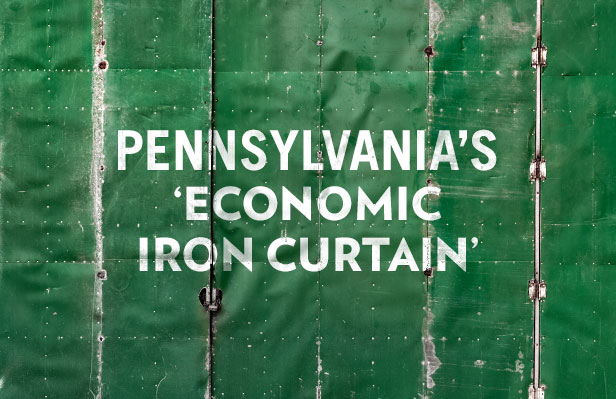Media

Pennsylvania’s ‘Economic Iron Curtain’
Imagine discovering buried treasure on your property. Suddenly, you can provide for your family, send your kids to college debt-free, pay off your parent’s mortgage, or fund your retirement. It would be a dream come true.
Now imagine someone taking it all away—forcing you to keep that treasure locked up, buried, and useless. How would you feel?
Wayne County’s Curt Coccodrilli doesn’t have to imagine.
As property owners, businesses, and workers reap the fruits of natural gas production to the west, Coccodrilli lives behind an “economic iron curtain” constructed by unelected regulators who have imposed a de facto fracking ban.
There is an economic iron curtain that we are trying to break down.
Curt Coccodrilli
“We have a farm where you could see drilling rigs in the distance, but we weren’t allowed to drill,” says Coccodrilli, a principal of the Wayne Land and Mineral Group (WLMG). “There is an economic iron curtain that we are trying to break down.”
The battering ram Coccodrilli hopes will topple this iron curtain is a lawsuit seeking to overturn a fracking prohibition imposed by the Delaware River Basin Commission (DRBC) for the last seven years.
The suit, filed last May in federal court, holds the DRBC has unlawfully claimed authority over “nearly all forms of human activity” in the river basin by proposing regulations for gas wells in 2010, never adopting them, but still refusing to consider any applications for drilling.
The DRBC’s roadblock so frustrated two large gas developers that they abandoned exploration of the area, taking with them $187 million in guaranteed payments to land owners, reports Coccodrilli.
Another company—Pittston, Susquehanna County-based Linde Corp.—has been both a beneficiary of Marcellus Shale gas development and a victim of the DRBC’s drilling ban.
“Just when everything was crashing in 2008, the Marcellus work came along and picked up business,” says Scott Linde, CEO of the infrastructure builder. Marcellus-related work such as pipeline construction now constitutes about 70 percent of Linde’s business.
But Linde estimates employment at his company—currently 200-300 people— would be 30-40 percent greater if fracking were allowed in Wayne County. “The area has lost a huge amount of money Wall Street was prepared to invest in compressor stations and other infrastructure,” he says.
For most of its existence, the DRBC took a “non-ideological and engineering-oriented” approach to allocating Delaware River basin waters on behalf of the four sponsoring states of Pennsylvania, New York, New Jersey and Delaware, says Tom Shepstone, a land-use consultant in Honesdale, Wayne’s county seat. But that approach has changed in recent years, and Wayne County has been boxed out of an economic boom.
“When I look at Susquehanna County I see remarkable changes because of gas drilling—restaurants, hotels, all kinds of new businesses and people I know personally who have found things that they can do as real careers,” says Shepstone.
As for claims that drilling would harm water supplies, Shepstone points to the Susquehanna River Basin Commission’s years of data to show “water quality has been getting better, not worse, while people have been allowed to develop their resources.”
Still, Shepstone notes, the Delaware River commission steadfastly ignores the Susquehanna experience even though some of the same people participate in both organizations.
To Coccodrilli, the DRBC may claim to promote economic development but it really “focuses on fly fishing, kayaking and butterfly watching—nothing that provides family-sustaining jobs.” He dismisses recent reports that the DRBC may soon act on its seven-year-old draft regulations and hopes instead that the landowners’ suit resolves the stalemate.
But hope is wearing thin. On March 27, a judge dismissed WLMG’s lawsuit, though the organization quickly announced it is appealing the ruling.
“I hope the court case forces the four governors to ask themselves how much autonomy has been lost to the DRBC,” says Coccodrilli, “And how has it devolved into this authoritarian organization?”
These are good questions for taxpayers, small business owners, and job seekers in Wayne County to ask as well.
With New York to the North and Maryland to the South imposing complete fracking bans, Pennsylvania is poised to out-compete these states for energy investment and job opportunities in the coming years. How tragic if, instead, Wayne County residents remain trapped behind an economic iron curtain.
Gordon Tomb is a senior fellow with the Commonwealth Foundation, Pennsylvania’s free market think tank.